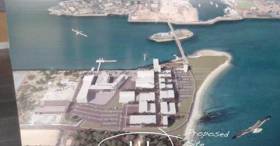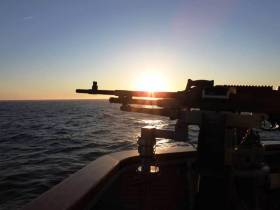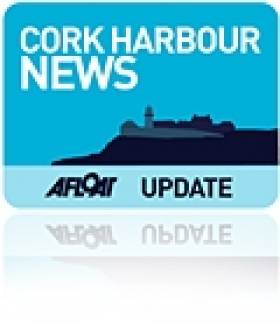Displaying items by tag: Indaver
Cork Harbour: License Sought for Incinerator Despite Ongoing Court Case Over Planning
A citizen group based in Cork which is against a planned incinerator in Ringaskiddy has criticised Indaver Ireland’s application for an emission licence despite a pending court judgment on the validity of planning permission.
As GreenNews.ie reports, Cork Harbour Alliance for a Safe Environment (CHASE) said that it has been recently informed by Indaver of its plans to proceed with an application to the Environmental Protection Agency (EPA).
“Indaver are obviously presuming that their permission will stand in advance of any High Court decision, which we believe is a premature assumption,” Mary O’Leary, Chairperson of CHASE said.
Ms O’Leary reiterated the group’s concerns about the health implications of living near an incinerator, reasoning that scientific studies have shown that “particles coming out of incinerators are more toxic than for other combustion processes”.
A new study carried out by Chinese researchers has revealed that fine particles emitting from urban waste-to-energy plants can“contain high amount of toxic compounds and pose a serious threat to environment and human health”.
The High Court commenced hearing the controversial incinerator case earlier in March with no final judgment issued yet.
For further reading on this story click here.
Why Has No Politician Expressed Concern In The Dáil About The 'Strategic Implications' Threatening The Naval Service?
Why has no politician of any hue, Government or Opposition, of any party or of the Independents, raised concern in the Dáil about the strategic implications for the State of the threat to a fully operational Naval Service and its joint operations with the Air Corps? Scroll down to listen to the podcast below.
Why has no one questioned the Taoiseach who, in the formation of the new Government, took to his own responsibility the Department of Defence, about these issues? The Department has stated, clearly and unambiguously, in public that Naval and Air Corps joint operations, including those directed towards marine counter-terrorism, replenishment of Naval vessels at sea and other operations, are under threat.
The Haulbowline Naval Base is “an important strategic location for the Irish Defence Forces..”
“It is the only Naval Service base in Ireland..” The threat to it “cannot be an acceptable situation for the necessary functioning of a fully operational Naval Base.”
Those are not my opinions. They are those of the Department of Defence.
And yet, they do not seem to worry the members of our National Parliament.
Not a mention in the Dáil, the assembly of the duly-elected representative of the people, no concern expressed about the “strategic implications” for the country’s Navy and Air Corps.
Either the politicians have no interest in the defence of the nation or they care little about the maritime defence force and its joint operations with the Air Corps.
I live in Cork Harbour and when I look out my kitchen window I see three wind turbines powering chemical factories close by and I can see the operations of several of these plants every day from my home, so I am well used to the heavy industrialisation of the harbour. However, this is an issue of the operations of the Navy and Air Corps, identified by the Department of Defence as having "strategic implications for the State" and which, as the Department has said, makes it a nationalo, not a local issue.
This week on THIS ISLAND NATION radio programme which you should listen to here, the Managing Director of the commercial company which is posing those identified threats to the Naval Service and Air Corps, tells me that the Services should “compromise” with the operations of his company, which will co-operate with them.
In my long years of journalism, half-a-century at this stage, I have never before heard any company suggest that the nation’s defence forces should have to compromise with a commercial operation, which is not a benign, beneficent public service but an international operation with a profit motive. I had presumed that the Defence Forces are vital to the structure of a democratic nation and should be considered above such pressure from commercial interests.
John Ahern, Managing Director of Indaver Ireland, whose incinerator proposed for Ringaskiddy, close to the Naval Base, has been described by the Department of Defence as posing those unacceptable strategic implications for the Navy and Air Corps, agreed to be interviewed by me on this specific issue. He had extended the invitation to interview him. In the course of it he expressed respect for the Navy, but told me that the State, in regard to his company’s proposals, had two tasks – management of waste and operation of the Naval Service. I expressed surprise that he equated the two and reminded him that, during an accident causing explosion and fire at the Indaver plant at Antwerp Port earlier this year, all those in the vicinity were told to “stay indoors.” Was he suggesting that the Navy would have to “stay indoors” in the event of an accident at his plant? There is only one road servicing the Naval Base on Haulbowline, which the proposed incinerator would be built alongside. He accepted that there is no guarantee against accidents, even though his company theoretically maintains that there would be none which would impact on the Navy and he indicated that it would be a matter for the Naval Service to decide its response if there was an accident. He said his company had suggested an alternative escape route through nearby premises of the National Maritime College/IMERC, though he also said that people in that area, just across the road from the proposed incinerator site, might have to be told to “stay indoors” in the event of an accident.
We did not agree, as I believe that the Naval Service should be of priority importance to the nation and its operations should not be subject to any threat from commercial interests and that there should be no strategic implications for it and the Air Corps, which has said that incinerator operations will cause a ‘no fly zone’ to be imposed over the Naval Base.
I was overly concerned with Naval Service operations, in his view.
I do not agree.
Mr. Ahern appeared confident of gaining approval from Bord Pleanala, the national planning board, to proceed with the incinerator construction after a public hearing which has concluded and a decision is awaited.
Can it be that this Board, unaccountable to anyone, now has the power to decide on future Naval Service and Air Corps operations?
Can this be acceptable in an independent nation, that a planning board and not the Government, should have the power to decide on the future operations of Defence Forces?
Also on the programme, the President of the Nautical Institute, the world representative organisation for professional seafarers, says that Ireland needs a strong maritime voice. I agree with this view expressed by Captain Robert McCabe
Regrettably, it seems that a strong voice of concern about the “strategic implications” for the “fully operational” maritime defence force, the Naval Service and it Air Corps operational partners, is not present in Dáil Eireann.
Listen to the podcast below.
Waste Firm Drops Court Challenge Over Cork Harbour Incinerator
#CORK HARBOUR NEWS - A waste management firm has dropped its High Court challenge against the refusal of planning permission for an incinerator in Cork Harbour, the Irish Examiner reports.
Indaver last night pulled out of its legal challenge just days before a full judicial review of An Bord Pleanála's decision on the €140 million project in Ringaskiddy was set to begin.
However, a harbour residents group opposed to the incinerator proposals have given the "shock" move a cautious welcome.
Chase urged Indaver to "finally walk away" from the project as it has emerged the company is in pre-applications talks with An Bord Pleanála under its 'strategic infrastructure' process.
The Irish Examiner has more on the story HERE.


























































